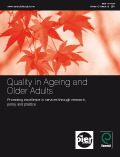Purpose ’
The population of older people in the UK is expected to rise rapidly over the next 20 years and therefore identification of effective interventions that prevent functional decline and disablement is a public health priority. This review summarises the evidence for interventions in community settings that aim to prevent or delay disablement in later life.
Design/methodology/approach ’
A search of review-level literature was conducted for the period September 1999 and 2009 of Ovid MEDLINE, EMBASE and CINAHL databases. It included interventions that aimed to prevent disablement of community dwelling older people (50+ years old). It excluded interventions carried out in institutional care and those focused on specific disease. The reviews were screened using the AMSTAR assessment tool.
Findings ’
The search identified 62 reviews of complex interventions (preventative home visits (n=9), integrated service delivery/case management and comprehensive geriatric assessment (n=6), falls prevention (n=17), exercise (n=15), nutritional needs (n=3), medication review (n=2), telecare/telehealth (n=5), social integration interventions (n=3) and vision screening (n=2).
Originality/value to Conclusion ’
The review identified many areas of unknown effectiveness, partly due to unstandardised use of outcomes and poor experimental design. The most promising complex interventions include: assessment of risk factors; and direct referral to an easily accessible, comprehensive range of interventions that are tailored to need and include long-term follow up. There is consistent evidence that exercise can be beneficial, particularly in preventing falls, but overall, the evidence-base for other specific interventions is limited.




